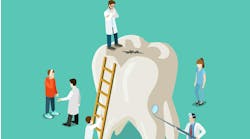The buzz words are “oral medicine.” Current research demonstrates a correlation between oral inflammation and systemic diseases, such as cardiovascular diseases and diabetes. Researchers are finding that certain inflammatory mediators play an important role in the biochemical chain of events responsible for inflammation, including the production of C-Reactive Protein. Inflammation can be measured with a simple blood test for C-Reactive Protein (CRP). Elevated levels create a greater risk for a heart attack than high cholesterol. As oral health educators, we are responsible to share this information with patients and the public. This is serious stuff, and I include something about this topic in every lecture that I present.
Last November, I consulted in the dental practice of Drs. Jeff Amann and Scott Graslie in Spearfish, S.D. A week later, I received an e-mail from one of the hygienists. She had talked with her sister, a hygienist in California, about my work with her office. Her sister had a hygienist friend in California who had heard me speak at a dental meeting. Nothing unusual here ... until you here the rest of the story. It speaks for itself.
“Dear Annette, first I have to say I enjoyed your lecture at the Discus meeting in Las Vegas last May. It was very informative, and we are using some of your verbiage on a daily basis.
“I also want to thank you for discussing some of the latest research regarding CRP and its impact on our work as dental hygienists and dental health-care professionals. Several of the speakers at the meeting had something to say about CRP levels. It certainly had an impact on my life. Here is what happened, in a nutshell.
“When I returned home from the meeting, I received some test results from a previous physical. My doctor thought my glucose number was slightly high and wanted me retested. When I went back for the testing, I asked if I could have my CRP level checked. I thought the doctor would think I was a crazy know-it-all since I’d been to some seminar. But that did not happen, and the doctor ordered the test.
“The doctor called me within 48 hours of the test and said I needed to be seen. My CRP level was elevated. “I about fell off my chair. I am 39 years old and in good health - or so I thought. My doctor told me I have an ‘incomplete right bundle branch block.’ She said this was common, but still abnormal. I wasn’t thrilled. She recommended that I see a cardiologist. Boy, had this thing escalated!
“Annette, I am not sure if my story will interest anyone, but I am glad that I followed up after your lecture and asked for the CRP testing. I am now being monitored by a cardiologist, and, at age 39, I never would have considered any of this or even have known about the research had I not attended your lecture.”
This incident is a reminder that it is not just about “cleaning teeth.” Educating the public is our mandate. Be sure you and your staff keep current on the latest news in this area. Information is readily available on the Internet - Yahoo! Health, WebMD, all of the dental sites, or you can “Google” CRP. Have patient-friendly research articles readily available for patients in the reception area, treatment rooms, and at the business desk. Include the research in your office newsletter and in statements and all correspondence. Be sure to update the patient health history and explain why it is so important.
There’s more to oral health and hygiene than plaque and calculus, and all risk factors must be considered. Hygienists who discuss the information with their patients are one step closer to moving the patient beyond the “it’s-just-a-cleaning-and-no-big-deal mentality.” Informed patients are better motivated patients.
The patients you are seeing today may be perfectly healthy, but they may have a colleague, friend, or loved one who is at risk. You never know when you may be saving a life.
Annette Ashley Linder, BS, RDH, is a recognized leader in the field and an award-winning speaker and consultant. She is a featured speaker at dental meetings, and provides in-office consulting services with her team of business and clinical consultants. She may be reached at her Web site at AnnetteLinder.com, via e-mail at [email protected], or by phone at (772) 546-2207.





